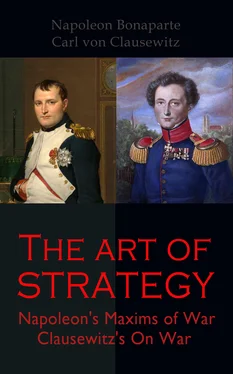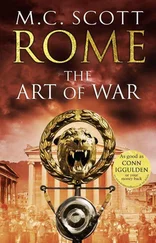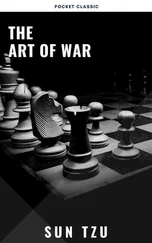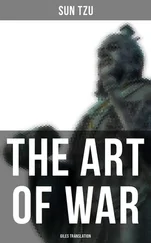The winter quarters of an army should be protected, likewise, by constructing small covered works on all the lines of approach to the cantonments, and by posting advanced guards of cavalry to observe the motions of the enemy.
6. A battle is to be sought, when there is reason to hope for victory, or when an army runs the risk of being ruined without fighting; also when a besieged place is to be relieved, or when you desire to prevent a reinforcement from reaching the enemy. Battles are useful, likewise, when we wish to profit by a favorable opportunity which offers, to secure a certain advantage, such as seizing upon an undefended point or pass, attacking the enemy when he has committed a fault, or when some misunderstanding among his generals favors the undertaking.
If an enemy declines an engagement, he may be compelled to it, either by besieging a place of importance, or by falling upon him unawares, and when he cannot easily effect his retreat. Or (after pretending to retire), by making a rapid countermarch, attacking him vigorously and forcing him to action.
The different circumstances under which a battle should be avoided or declined, are, when there is greater danger to be apprehended from defeat than advantage to be derived from victory; when you are very inferior to your adversary in numbers, and are expecting reinforcements; above all, when the enemy is advantageously posted, or when he is contributing to his own ruin by some inherent defect in his position, or by the errors and divisions of his generals.
To gain a battle, each arm must be advantageously posted, and have the means of engaging its front and in flank. The wings must be protected by natural obstacles, where these present themselves, or by having recourse when necessary to the aid of art.
The troops must be able to assist each other without confusion, and care must be taken that the broken corps do not fall back upon, and throw the rest into disorder. Above all, the intervals between the different corps must be sufficiently small to prevent the enemy from penetrating between them, for in that case you would be obliged to employ your reserves, and run the risk of being entirely overwhelmed. Sometimes victory is obtained by creating a diversion in the middle of a battle, or even by depriving the soldier of all hope of retreat, and placing him in a situation where he is reduced to the necessity either to conquer or die.
At the commencement of a battle, if the ground is level, you should advance to meet the enemy, in order to inspire the soldier with courage; but if you are well posted, and your artillery advantageously placed, then wait for him with determination: remembering always to fight resolutely, to succor opportunely those who require it, and never to bring your reserves into action except in the last extremity; and even then to preserve some support, behind which the broken corps may rally.
When it is necessary to attack with your whole force, the battle should commence toward evening; because then, whatever be the issue, night will arrive to separate the combatants before your troops are exhausted. By this means, an opportunity is afforded of affecting an orderly retreat if the result of the battle requires it.
During an action, the general-in-chief should occupy some spot whence he can, as far as possible, overlook his whole army. He should be informed, immediately, of everything that passes in the different divisions. He should be ready, in order to render success more complete, to operate with fresh troops upon those points where the enemy is giving way, and also to reinforce his own corps wherever they are inclined to yield. When the enemy is beaten, he must pursue him instantly, without giving him a moment to rally; on the other hand, if he is himself defeated, or despairs of victory, he must retreat in the best possible order.
7. It shows great talent in a general to bring troops, who are prepared for action, into collision with those who are not: for example, fresh troops against those which are exhausted—brave and disciplined men against recruits. He must likewise be ready always to fall with his army upon a weak or detached corps, to follow the track of the enemy, and charge him among defiles before he can face about and get into position.
8. A position is good when the different corps are so placed as to be engaged with advantage, and without any remaining unemployed. If you are superior in cavalry, positions are to be taken in plains and open ground; if in infantry, in an enclosed and covered country. If inferior in numbers, in confined and narrow places; if superior, in a spacious and extensive field. With a very inferior army, a difficult pass must be selected to occupy and fortify.
9. In order to obtain every possible advantage from a diversion, we should ascertain first, that the country in which it is to be created is easily penetrated. A diversion should be made vigorously, and on those points where it is calculated to do the greatest mischief to the enemy.
10. To make war with success, the following principles should never be departed from:
To be superior to your enemy in numbers, as well as in morale ; to fight battles in order to spread terror in the country; to divide your army into as many corps as may be effected without risk, in order to undertake several objects at the same time; to treat WELL those who yield, to ILL treat those who resist; to secure your rear, and occupy and strengthen yourself at the outset in some post which shall serve as a central point for the support of your future movements; to guard against desertion; to make yourself master of the great rivers and principal passes, and to establish your line of communication by getting possession of the fortresses, by laying siege to them, and of the open country, by giving battle; for it is vain to expect that conquests are to be achieved without combats; although when a victory is won, they will be best maintained by uniting mildness with valor.
Table of Contents
A general-in-chief should ask himself frequently in the day: “What should I do if the enemy’s army appeared now in my front, or on my right, or my left?” If he have any difficulty in answering these questions, his position is bad, and he should seek to remedy it.
In the campaign of 1758, the position of the Prussian army at Hohen Kirk, being commanded by the batteries of the enemy, who occupied all the heights, was eminently defective; notwithstanding, Frederick, who saw his rear menaced by the corps of Laudon, remained six days in his camp without seeking to correct his position. It would seem, indeed, that he was ignorant of his real danger: for Marshal Daun, having manœuvred during the night in order to attack by daybreak, surprised the Prussians in their lines before they were able to defend themselves, and by this means surrounded them completely.
Frederick succeeded, however, in effecting his retreat with regularity, but not without the loss of ten thousand men, many general officers, and almost all of his artillery. If Marshal Daun had followed up his victory with greater boldness, the king of Prussia would never have been able to rally his army. On this occasion, Frederick’s good fortune balanced his imprudence.
Marshal Saxe remarks, that there is more talent than is dreamt of in bad dispositions, if we possess the art of converting them into good ones when the favorable moment arrives. Nothing astonishes the enemy so much as this manœuvre; he has counted upon something ; all his arrangements have been founded upon it accordingly—and at the moment of attack it escapes him! “I must repeat,” says the marshal, “there is nothing that so completely disconcerts an enemy as this, or leads him to commit so many errors; for it follows, that if he does not change his arrangements, he is beaten; and if he does change them, in presence of his adversary, he is equally undone.”
Читать дальше












